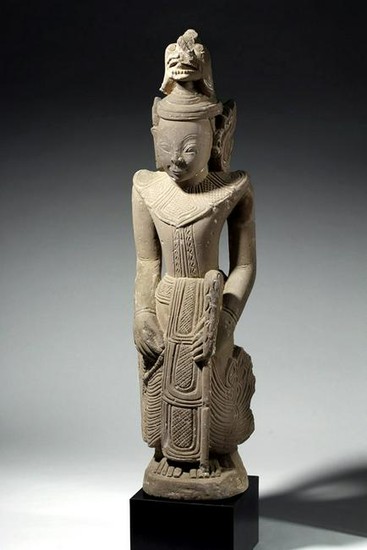17th C. Burmese Sandstone Carving of Nat - Shindaw
Southeast Asia, Burma (Myanmar), Ava Period, ca. 17th century CE. A tall, beautifully-carved and completely in-the-round sculpture of a nat, a spirit worshiped in Burma alongside Buddhism. Hand-carved from a pale red sandstone, the statue stands with its head tilted slightly down and a playful expression on its face; it has large, almond-shaped eyes and well-defined eyebrows above a realistic nose and mouth. Size: 6.9" L x 11.25" W x 37.5" H (17.5 cm x 28.6 cm x 95.2 cm); height on stand: 42" (106.9 cm).
This sculpture is probably a portrayal of Shindaw, a young prince whose father, the king of Ava, placed him with the abbot of Hnatpyittaung Paya to be educated as a novice monk. While there, he died of a snakebite, thus becoming a nat - a spirit who, in human life, met with a violent death. Shindaw is represented in sculpture and painting as we see here, standing on a pedestal with a snake headdress, rosary beads in his left hand, and a fan in his right. In this portrayal, he wears his princely attire and his headdress is elaborate, topped by the head of the snake with its mouth open to reveal surprisingly human teeth. His rosary beads rest against his side, incorporated into the detailed carving that shows the details of his clothing, complete with flame-like projections from the skirt. The fan in his right hand hangs down, expertly carved to give the impression that it is made of feathers.
The 37 Nats continue to be worshiped in Burma to this day, with pilgrimage sites, temples, relic sites, and festivals. The Nats have human characteristics, wants and needs, often portrayed as flawed and having desires that are taboo or immoral in mainstream Buddhism. Statues like this one that venerate them hint at that characteristic with their faces, which often show a greater range of emotion than those of the Buddha.
See two very similar examples of Nat statues in pale red sandstone at the Northern Illinois University Center for Burma Studies: http://www.niu.edu/burma/collections/art/sculptures/sculpture_54.shtml and http://www.niu.edu/burma/collections/art/sculptures/sculpture_55.shtml.
Provenance: Ex-Private Maricopa County, AZ collection, acquired in Bangkok in 2000
All items legal to buy/sell under U.S. Statute covering cultural patrimony Code 2600, CHAPTER 14, and are guaranteed to be as described or your money back.
A Certificate of Authenticity will accompany all winning bids.
We ship worldwide to most countries and handle all shipping in-house for your convenience.
#120724
Condition Report: Remains of white pigment, especially on back. Small area of discoloration on upper part of one arm. Losses to mouth and head of headdress and to one side of wings on legs. Excellent remaining detail.
View it on
Estimate
Time, Location
Auction House
Southeast Asia, Burma (Myanmar), Ava Period, ca. 17th century CE. A tall, beautifully-carved and completely in-the-round sculpture of a nat, a spirit worshiped in Burma alongside Buddhism. Hand-carved from a pale red sandstone, the statue stands with its head tilted slightly down and a playful expression on its face; it has large, almond-shaped eyes and well-defined eyebrows above a realistic nose and mouth. Size: 6.9" L x 11.25" W x 37.5" H (17.5 cm x 28.6 cm x 95.2 cm); height on stand: 42" (106.9 cm).
This sculpture is probably a portrayal of Shindaw, a young prince whose father, the king of Ava, placed him with the abbot of Hnatpyittaung Paya to be educated as a novice monk. While there, he died of a snakebite, thus becoming a nat - a spirit who, in human life, met with a violent death. Shindaw is represented in sculpture and painting as we see here, standing on a pedestal with a snake headdress, rosary beads in his left hand, and a fan in his right. In this portrayal, he wears his princely attire and his headdress is elaborate, topped by the head of the snake with its mouth open to reveal surprisingly human teeth. His rosary beads rest against his side, incorporated into the detailed carving that shows the details of his clothing, complete with flame-like projections from the skirt. The fan in his right hand hangs down, expertly carved to give the impression that it is made of feathers.
The 37 Nats continue to be worshiped in Burma to this day, with pilgrimage sites, temples, relic sites, and festivals. The Nats have human characteristics, wants and needs, often portrayed as flawed and having desires that are taboo or immoral in mainstream Buddhism. Statues like this one that venerate them hint at that characteristic with their faces, which often show a greater range of emotion than those of the Buddha.
See two very similar examples of Nat statues in pale red sandstone at the Northern Illinois University Center for Burma Studies: http://www.niu.edu/burma/collections/art/sculptures/sculpture_54.shtml and http://www.niu.edu/burma/collections/art/sculptures/sculpture_55.shtml.
Provenance: Ex-Private Maricopa County, AZ collection, acquired in Bangkok in 2000
All items legal to buy/sell under U.S. Statute covering cultural patrimony Code 2600, CHAPTER 14, and are guaranteed to be as described or your money back.
A Certificate of Authenticity will accompany all winning bids.
We ship worldwide to most countries and handle all shipping in-house for your convenience.
#120724
Condition Report: Remains of white pigment, especially on back. Small area of discoloration on upper part of one arm. Losses to mouth and head of headdress and to one side of wings on legs. Excellent remaining detail.



